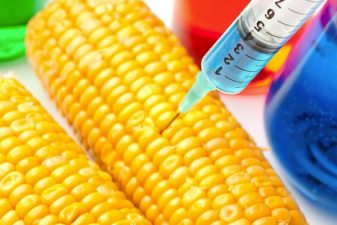 Human genetic material and human gelatin – coming to your marshmallows and Jello soon?
Human genetic material and human gelatin – coming to your marshmallows and Jello soon?
Reading the ingredients list in any processed food is always thought-provoking. If you really want to know what those mysterious combinations of letters and numbers mean, you have to become adept at Internet research. So I suppose it could be argued that artificial colors and flavorings, the various forms of sugars, like that derived from GM beets, addictive chemicals, and strange substances like meat glue are actually good for us.
I mean, it’s intellectually stimulating – tracking down their origins and possible side effects. Like a puzzle or a good detective story, right?
Not.
Now how about human genes in your drug capsules, dessert, or cosmetics?
The latest stomach-turning development in the science of food processing is gelatin derived from human genetic material. According to the American Chemical Society, scientists at the University of Chemical Technology in Beijing, China, are working on culturing human collagen genes to yeast. In this highly synthesized process, the human-DNA-laden yeast does what yeast does so well, reproducing itself many times over and making massive amounts of gelatin. Human-derived gelatin. The advantage in this gelatin over the conventional animal-based kind, is being able to get around allergic responses and risk of infectious diseases carried by animals, claim the Chinese scientists. Is it vegan?
Having spoken to a biochemist of my acquaintance who prefers to remain anonymous, it becomes clear that the gross-out factor is the major deterrent in our minds. There’s no question of cannibalism. It’s not necessary to boil down human bones or skin. An inner-cheek swab would provide enough DNA to start the synthesis. According to my source, the manufacturing process is already well-known and widely used. And the original human material is so remote from the finished product that ethical concerns are irrelevant.
Well, it depends on what you consider ethical. To observant Jews and Muslim, not to mention vegetarians or vegans, this kind of food is abhorrent. In addition, humans are full of infectious diseases, just like animals, so the “cleaner than animal-based” argument seems specious.
Since this human-derived gelatin falls under the safe food category, it might not even be required to appear on labels. One more reason to avoid processed foods. As if we needed another reason.
Yet the scientist I spoke to brought up another issue: this kind of gelatin is essentially another genetically modified food. It’s not yet known how our bodies ultimately react to synthetic foods. We were born with enzymes that help us metabolize animal and vegetable foods, but handling synthetic foods wasn’t built into our body’s blueprint. They are viewed as irritants by our natural systems and treated as such.
Now, what’s an allergy? Reaction to an irritant, isn’t it? And with current theories about the origins of many cancers coming from constant cellular irritation, you really do have to pause for thought. Before you treat your child to GMO food, swallow a capsule, or apply makeup, that is.
More on creepy synthetic foods to avoid on Green Prophet:
Photo of Jello by Paul.Carroll via Flickr




Is it vegan?
I used to be much more neutral about GM foods, and also believed that there was a huge potential for good.
This is one article that has me turning the idea over again: http://news.discovery.com/earth/gm-plant-canola-wild.html . We do not always know the long term results of GM.
Or as a programmer friend of mine put it: “As a programmer, experience has shown me that altering a part of a process can have negative effects at a distant part of that process. In any system of interrelated programs, output from program A is input to programs B, G, X, and Z. The…ir output is input to several other programs. In my career I’ve occasionally received late night calls because an innocent change to program B has caused a crash in some program four iterations down the processing line. Even with good documentation and programming practices, a minor change can activate a flaw in a not-do-robust program elsewhere in a data processing microcosm. Arrogant programming pretty much guarantees disaster.
Businesses use systems of thousands of programs to manage their data. It can get very complicated, but with access to the source code and time spent in study and testing, programmers can know for certain that their changes will not cause problems. This is a goal nearly unachievable in genetic engineering. I submit that the complication of a business process compares to the complication of nature as a the simplicity of a mechanical calculator compares to complication of the space shuttle. Man should only be “programing” nature in scenarios where we can ABSOLUTELY CONTROL the RANGE of EFFECT. Anything else is arrogant. The subject of this linked story is arrogance confirmed.”
Jonathan, your comments are valuable, but I’m afraid that your eye lit on the word “cannibalism,” and you stopped reading there. I stated clearly that the gross-out factor is the major deterrent in people’s minds and that the original human material is so remote from the finished product that it doesn’t form an ethical concern.
My main objection to this kind of food, kashrut considerations apart, is the fact that our bodies were not made to handle GM food, which this is. Yes, and thank you for opening my mind to the presence of GM rennet in yellow cheese. I now realize that I’d best avoid “gvina tzehuva” and spend my money on the real thing.
The gelatin purchased in your local health food store or supermarket may come contaminated with prions (mad cow) or viruses or bacterial pathogens as well as extraneous allergenic proteins from the animals from which it was extracted. The gelatin made in the yeast will be ultra-clean due to the way it is produced, not coming from slaughter houses, but from ultra-clean, sterile fermenters.
Orthodox Judaism has made it very clear that proteins produced by genetically engineered bacteria, yeast, or plants are not considered animal proteins even when the gene that encodes the protein originally derived from an animal source. This is why you see Kosher certificates on yellow-cheeses made with genetically engineered rennet
While the gelatin in question will have the same sequence of amino acids as the original animal one, the gene itself is actually quite different, due to the universal genetic code having slight “dialect” preferences, and the gene was re-synthesized by machine to have it contain the preferences of the yeast. Also, the part of the gene that controls the levels of expression was changed to that of yeast. Thus what you have is a yeast gene producing an animal-equivalent protein.
Thus, this is far less cannibalistic than licking a sore, swallowing your saliva, or French kissing (all cases where human proteins are ingested), and is far more healthful. Thus, the article is just a case of journalistic populism and hysteria-mongering, quite unbecoming of Green Prophet.
Genetic engineering has much to offer the environment – both human (as in this case) as well as agricultural and natural.
The human mind is like a parachute – best used while open.
Maurice, this has to do with food and health, both lively topics on Green Prophet. Considering that a food originating from human material is, as I wrote, abhorrent to both Judaism and Islam, I believe it fits in here.
Secondly, I don’t know if this was posted on Treehugger. I scan a number of online journals for topics of interest to our readers. In any case, Green Prophet often quotes from other sources, Treehugger among them.